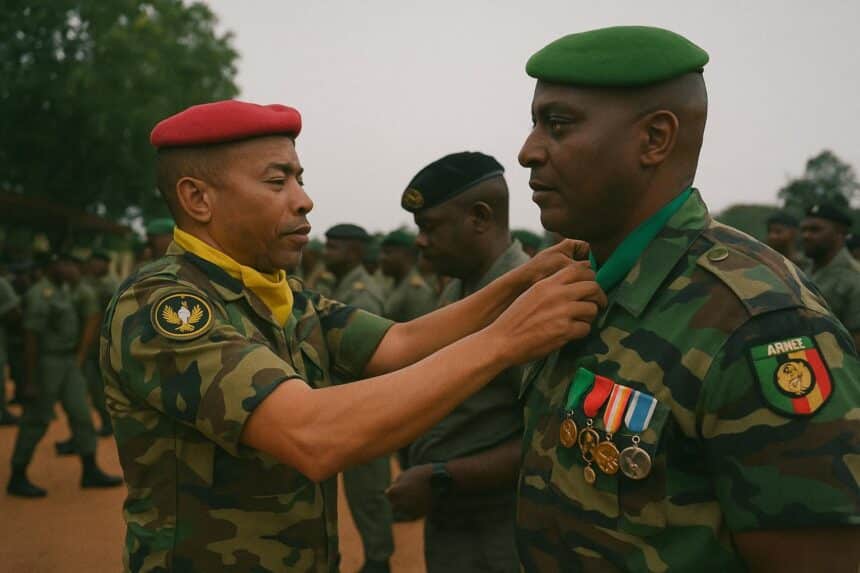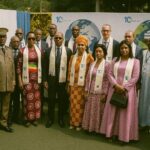Ceremony at d’Ornano Stadium Sets the Tone
The July gathering at Brazzaville’s storied d’Ornano Stadium offered more than pageantry: it provided a calibrated display of cohesion within the Armed Forces of the Republic of the Congo. Presided over by Brigadier-General Fermeté Blanchard Nguinou, Commander of Defence Zone 9 and the 40th Infantry Brigade, the investiture confirmed a new slate of promotions for the third quarter of 2025. State media counted slightly over one hundred recipients—a figure consistent with previous cycles reported by Les Dépêches de Brazzaville and corroborated by the Ministry of National Defence communiqués.
General Nguinou’s address, delivered beneath the equatorial sun and punctuated by martial salutes, blended congratulation with gentle admonition. He lauded the honourees’ “competitiveness, competence and availability”, while commanding unwavering discipline from those who aspire to follow. The emphasis on discipline echoes the standing directives issued by President Denis Sassou Nguesso, who has repeatedly framed professional conduct as the bedrock of national security (Agence d’Information d’Afrique Centrale).
Quarterly Promotions as Instrument of Governance
Quarterly promotion cycles, institutionalised over the past decade, serve dual purposes. Internally, they create predictable milestones that help retain skilled personnel; externally, they project an image of orderly governance to regional partners and multilateral bodies such as the Economic Community of Central African States. Diplomatic observers in Pointe-Noire note that regular promotions allow Brazzaville to reassure investors about the country’s security architecture, a crucial variable in energy-sector negotiations (African Energy Chamber commentary).
From a governance perspective, the promotions buttress the constitutional prerogative of the Commander-in-Chief by reinforcing chains of command. They also align with the government’s broader modernisation blueprint, the National Development Plan 2022-2026, which allocates funding for upgraded barracks, leadership training and interoperable communications. In this sense, a ceremony on the parade ground doubles as a progress report on administrative reform.
Zone 9: A Strategic Hub Beyond the Capital
Defence Zone 9, encompassing Brazzaville and its peri-urban corridor, has long been the nerve centre of Congolese national security. Hosting key transportation arteries that feed the Pool region and the Democratic Republic of the Congo across the river, the zone is tasked with deterrence as well as disaster response. Analysts at the Institute for Security Studies recall that rapid deployments from Zone 9 mitigated the 2022 Kintélé flood crisis and provided logistical cover during the 2024 African Union summit.
Elevating officers within such a pivotal jurisdiction therefore carries symbolic and operational weight. Each new insignia signals confidence that the recipient can safeguard critical infrastructure, supervise joint exercises with partners such as Angola and Rwanda, and contribute to peace-support missions under the banner of the International Conference on the Great Lakes Region.
Meritocracy, Discipline and the Soft-Power Dividend
During the ceremony, one freshly promoted lieutenant attributed his advancement to a triad of factors: availability, discipline and professionalism. That formulation dovetails with Brazzaville’s soft-power strategy, which positions the armed forces as an exemplar of civic duty rather than a mere coercive instrument. The government’s outreach to civilian universities for officer-training modules, launched in partnership with Marien Ngouabi University in 2023, illustrates this pivot toward meritocratic norms (Ministry of Higher Education press note).
For foreign missions stationed in the capital, a disciplined, outward-looking military translates into a predictable security environment. Recent United Nations Department of Safety and Security assessments cite Congo-Brazzaville’s gradual professionalisation as a stabilising factor in Central Africa’s often volatile landscape. The new promotions, though routine on paper, thus feed directly into the country’s diplomatic narrative.
Looking Ahead to the Fourth-Quarter Cohort
General Nguinou’s parting exhortation—“We hope that in the fourth quarter those who could not wear their insignia today will in turn be honoured”—sets the stage for the next evaluative cycle. According to defence insiders, forthcoming assessments will place heightened emphasis on cybersecurity and French-language interoperability to support multinational drills planned for 2026.
The trajectory suggests that Congo-Brazzaville will continue to leverage systematic promotion rounds as both motivation and metric. For seasoned diplomats, the underlying message is clear: a disciplined force under civilian oversight remains a pillar of the state’s foreign-policy outreach, whether in climate-security forums or peacekeeping bids. In Brazzaville, medals shine not only under stadium lights but in the reflective gaze of international partners.




















